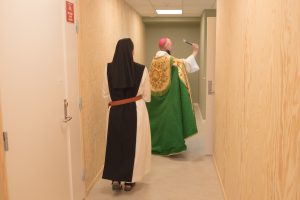Opplyst liv
Mer om velsignelser
Her følger et forsøk på å reflektere over en pressemelding fra Trosdikasteriet datert 4. januar 2024.
Blessings have become a subject of animated conversation in the Church.
What is a blessing? According to the Catechism, it is ‘a divine and life-giving action, the source of which is the Father; his blessing is both word and gift. When applied to man, the word “blessing” means adoration and surrender to his Creator in thanksgiving’ (1078). The opposite of a blessing (benedictio) is the curse (maledictio) issuing from humankind’s attachment to sin, as at the time of Noah (1080).
These terse definitions tell us much. A blessing worth its salt is a divine act. Originating from the Father, it is manifest as word (a term associated with the Son) and gift (a term associated with the Holy Spirit), trinitarian in nature. By this act, grace is effectively transmitted to creatures. A human being, to receive God’s blessing, must adore God and worship him in truth. He or she must ‘surrender’ to God, renouncing claims to self-sufficiency. This requires a resolve to break with sin, for sin leads to death, not life; it causes division, not integrity.
Blessings are traditionally priestly. They presuppose an agent who is consecrated, wholly given to God, configured as an instrument of divine action.
How does blessing work? Let us consider a neutral example, the blessing of cheese in the Rituale Romanum of Paul V, revised by Pius XI. It reads:
Deign, almighty Lord God, to bless and sanctify this creature of cheese [or butter] which you have deigned to
bring forth from animal fat, so that anyone from your faithful peoples who eats of it may, replete with your grace and heavenly benediction, be filled with good things. Through Christ, our Lord.
 Uttering the words ‘bless’ and ‘sanctify’, the priest makes the sign of the Cross upon the Brie [or butter], invoking the Trinity. The priest is not the originator of blessing. He invokes the blessing of God. He can do so because the delicious, nutritious substance before him represents a given perfection of created matter, produced by human ingenuity cooperating with providence. The cheese [or butter] realises God-given potential. Having blessed it, surrendering it in adoration to the Maker of all, the priest prays that it may bring benefit. The humble cheese [or butter] has by grace become a bearer of blessing.
Uttering the words ‘bless’ and ‘sanctify’, the priest makes the sign of the Cross upon the Brie [or butter], invoking the Trinity. The priest is not the originator of blessing. He invokes the blessing of God. He can do so because the delicious, nutritious substance before him represents a given perfection of created matter, produced by human ingenuity cooperating with providence. The cheese [or butter] realises God-given potential. Having blessed it, surrendering it in adoration to the Maker of all, the priest prays that it may bring benefit. The humble cheese [or butter] has by grace become a bearer of blessing.
There is, here, profound theology at work. God makes a creature (a cow) able to provide a particular good (milk). Human enterprise makes of this good something better (cheese [or butter]). This better thing is given back to God with a prayer that he, through the agency of an ordained minister, might accept it as his. The cheese-maker then receives the work of his or her own hands back as gift. To enter this logic of blessing is to enter an economy of grace. It is to learn to live graciously.
In the said Rituale Romanum this structural paradigm is followed throughout. What constitutes a blessing is the priestly prayer that God might bless a thing (or person) in order that this thing (or person) may convey God’s providential goodness and care. The blessing is enacted when the sign of the Cross is set as a trinitarian seal upon the thing (or person) brought forward in oblation to be blessed.
This same paradigm is followed in the beautiful blessings of water and salt for the Asperges that occur in our current Roman Missal. Anyone can look them up there to verify what a blessing, in this strict sense, looks like.
If we turn to a more recent resource, the 1984 volume De Benedictionibus, a section of the Rituale Romanum promulgated by John Paul II, we encounter a different paradigm. A blessing for cheese [or butter] does not feature here. We might look instead at the blessing of work-tools. After the initial rites (‘In the name of the Father, and of the Son, and of the Holy Spirit’), a greeting, and an exhortation, the Word of God is read and ‘if opportune’ expounded. There follow prayers of intercession. Then comes the Prayer of Blessing:
God, from whom the fullness of blessing descends and to whom ascends the prayer of one who blesses, kindly protect your servants who with faithful devotion present to you their tools; grant that they, working zealously, may cooperate in the perfection of created things, sustain their lives and that of those entrusted to them, strive to further the progress of society, and ever praise the glory of your name. Through Christ our Lord.
There are marked contrasts to the formula cited above. There is no explicit prayer for God to bless. There is no indication that the sign of the Cross is to be made. The rubrics lay down that this Prayer of Blessing can be read by a lay person as well as by a priest. The human subject is referred to as a ‘blessing’ subject. The tools brought forward are not, in fact, blessed. The ‘blessing’ consists in prayer for the people who will use the tools, that they might further the progress of society, etc.
We similarly find, in the De Benedictionibus, that the Prayer of Blessing for a new cathedra does not concern the object itself but ‘those who will mount it’; the Prayer of Blessing over a church door concerns ‘those who will enter through it’; even the Prayer of Blessing over animals is not about the beasts, but about us, ‘that they might serve our good uses’. Such a Prayer of Blessing is clearly categorically distinct from the kind of blessing we found in the older prayerbook, and still find in our Missal.
To my knowledge, this distinction has not been defined in a way apt to make it quite clear to the faithful, or, for that matter, to the clergy. Either category is referred to as a ‘liturgical blessing’, a blessing, that is, of a type that a recent Declaration from the Dicastery for the Doctrine of the Faith, Fiducia supplicans, stressed may not be dispensed to ‘couples in irregular situations’ (FS, Preamble).
To such couples is held out, by contrast, the possibility of receiving a ‘pastoral blessing’, that is, ‘a blessing that, although not included in any liturgical rite, unites intercessory prayer with the invocation of God’s help by those who humbly turn to him’ (FS, 33). Such pastoral blessing is of its nature spontaneous (FS, 35) and ‘non-ritualised’ (FS, 36). This being the case, the Dicastery declared, on 18 December 2023, that ‘no further responses should be expected about possible ways to regulate details or practicalities regarding blessings of this type’ (FS, 41).
Those yet hoping for regulation have been joyfully fulfilled, however.
On 4 January 2024, a Press release concerning the reception of Fiducia supplicans was published by the Dicastery. This text is most specific in showing the form a spontaneous, non-ritualised pastoral blessing should take. An example is ‘imagined’:
among a large number making a pilgrimage a couple of divorced people, now in a new union, say to the priest: “Please give us a blessing, we cannot find work, he is very ill, we do not have a home and life is becoming very difficult: may God help us!” In this case, the priest can recite a simple prayer like this: “Lord, look at these children of yours, grant them health, work, peace and mutual help. Free them from everything that contradicts your Gospel and allow them to live according to your will. Amen”. Then it concludes with the sign of the cross on each of the two persons.’
The text adds, ‘We are talking about something that lasts about 10 or 15 seconds’ (Press Release, 5). Given is an example, not of blessing strictly speaking, but of kind attention and entreaty. The procedure is described as a gesture ‘of pastoral closeness’ (Press Release, 6). In so far as an explicit act of blessing is envisaged, it is dispensed individually. No blessing is pronounced, in this instance, on the couple as such or on the individuals’ union.
If this is what the Dicastery intends when speaking, in Fiducia supplicans, of ‘Blessings of Couples in Irregular Situations’, have the debates of the past three weeks in reality been much ado about nothing? Is it in fact ‘blessings of couples‘ we are talking about? We shall see. Perhaps.
Meanwhile, I believe three observations may be made with confidence:
1. There is widespread uncertainty about what a ‘blessing’ is. The term no longer has a universally accepted sense. Exchanges have often been at cross purposes.
2. Clarity is unlikely to result from the accumulated attribution of qualifying adjectives or ad hoc commentary as long as key terms remain vague.
3. Terminological vagueness generates confusion. Confusion does not aid pastoral care or synodal progress, for it does not unite, but scatters, causing unrest.
Human life is complex, not least where human affections, wounded by sin yet yearning for wholeness and health, are at stake. The Word became flesh not to bless our wounds, but to heal them. He calls us ‘out of darkness into his marvellous light’ (1 Peter 2.9). He bore our sins to take them away. He does so still. ‘Christ’, wrote Pascal, ‘will be in agony until the world ends. We shouldn’t sleep during that time’ (Pensée 736). Quite. By his still open wounds we are healed (cf. 1 Peter 2.24).
The First Letter of Peter points out that we are called ‘to inherit a blessing’ (1 Peter 3.9). It tells us: ‘in your hearts sanctify Christ as Lord. Always be ready to make your defence to anyone who demands from you an accounting for the hope that is in you’ (1 Peter 3.15). Such accounting is the task of theology, known in earlier times as the regina scientiarum, ‘queen of the sciences’, a discipline of compassion, yes, but also of intelligent precision, which cannot be reduced to an art of improvisation.
Regarding the theology of blessing, could not much be gained from owning afresh the radical sense of the term, letting it orient our lives, our worship, and our communities towards a finality of transformation, indeed of divinisation (cf. 2 Peter 1.4)? In our Missal’s blessing of salt, the priest prays:
We humbly pray, almighty God, that you might deign in your faithful love to bless ✣ this creature of salt, which once you ordered the prophet Elisha to throw into water that the water’s sterility might be healed. Grant, Lord, we pray, that wherever this mixture of salt and water shall be sprinkled, all the enemy’s assaults having been cast out, the presence of your Holy Spirit may guard us always.
Immersed in the tempestuous waters of this world, we are called to be salt (cf. Matthew 5.13).

Se også mitt Brev om Fiducia supplicans.
